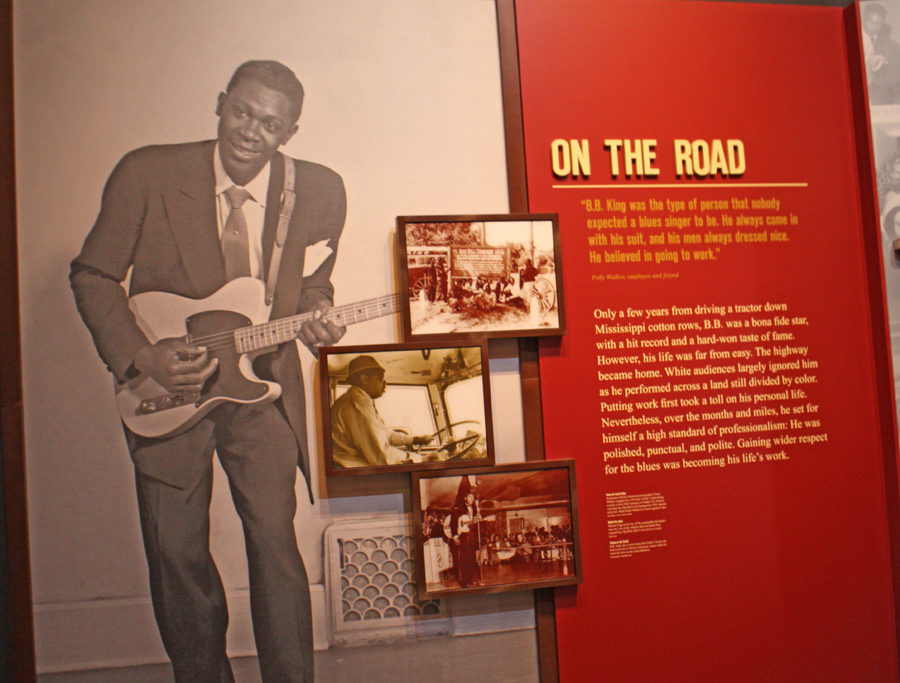|

Dedicated to the Memory of B. B. King
(September 16, 1925 - May 14 2015 )
The Blues might be considered the soul of
American music. It was born in the dark soil of the Mississippi
Delta and came of age at juke joints and small bars
where the field hands by day, musician by night
preformed. It grew to adulthood in an era where a African
American musician could entertain white patrons but nor sit in
the same bar with them after a performance. It was more than a
style of music. It was a cry for justice and a part of each
singer's soul. If one man could be said to have brought this
genera to the world's attention, that man is B. B. King.
 |
| Stature of "Lucille" in front of
the B. B. King Museum |
B. B. King passed away at the age of 89.
His music lives on. His museum in his hometown of
Indianola, Mississippi tells his story. That story
begins as you approach the front of the building. You come face
to face with a stature of "Lucille" one of his Gibson Guitars.
The guitar and his voice along with hard work and talent was
what raised a young man named Riley B. King from the ranks of
another Delta sharecropper to the heights of stardom.
 |
| Exhibit portraying The Early
Years, the Delta 1930s, |
First place stop in the museum is the
theater. It shows a great video of B. B. King's life. Then on
the exhibit of The Early
Years, the Delta 1930s, just
inside the museum. It depicts a juke joint and shows scenes of
life of a sharecropper in the Delta in the mid-1900s. There are
pictures of workers hoeing cotton and little shacks where they
lived. B. B. King's
dream then was simple, "I was going to have me a little farm. I
could picture myself plowing, picture seeing a beautiful woman
with my two or three kids coming out and bringing me some water.
Those were my dreams."
 |
| Exhibit portraying the Civil
Rights Movement in America |
You move on through his live in Mississippi
where he married and drove a tractor on a farm but his dream was
changing. His thoughts were turning towards Memphis and music.
The Memphis Gallery depict the ups and down
of an African American in the segregated 50s. One exhibit
depicts the first radio stations catering to the Blues and
featuring African American musicians, WGRM and WROX.
 |
| Early Black radio stations |
It was in Memphis that he gained the name
"B. B." standing for Blues Boy. The exhibits take you through
his first break, recording Three O'clock Blues and going on the
road in a country that still had a big color line. B. B. played
what was known as the "Chitlin' Circuit." He worked not only to
gain popularity for his own songs but to gain respect and a
wider audience for the Blues. By the 60s, B. B. King was a
respected name. The museum exhibits portray the awakening Civil
Right Movement and the effect it had on the Blues.
 |
| Exhibit about life on the road
for a Black musician |
The later year exhibits portray the honors
heaped on this one
time sharecropper. He has received 14 Grammies, 2 honorary
doctorates, the highest civilian award an American can receive,
The Presidential Medal of Freedom and many other accolades .He
met with heads of state, and preformed in places he had once
only dreamed about. All this to a young man who when he saw
Memphis for the first time said, "Memphis to me then was like
the Eiffel Tower, or the Tower of Pisa, or the Grand Canyon. I
saw streetcars for the first time. I saw buildings like I had
never seen before. God almighty, this was really something."
 |
| Some of the many artifacts in
the museum |
One of my favorite stories the museum
portrays is how "Lucille" got named. It came about in Arkansas
when B. B. was playing in
a rowdy bar. Two men got into a fight and knocked over a
barrel of heating oil. It set the bar afire, B. B. escaped but
rushed back inside to get his guitar. He named the guitar after
the woman the men were fighting over, Lucille, as a reminder
never to do such a stupid thing again.
 |
| How Lucille got her name |
The museum is filed with artifacts B. B.
generously donated, clothes, guitars, records and so much of his
personal life. There is a "Recording Studio" where you and try
your hand at you own style of the Blues. It's a place you do not
want to miss.
 |
| B. B. King's Studio |
My visit to the B. B. King Museum humbled
me and at the same time made me glad to live in a country where
a man can achieve such honor by his own merit. What B. B. King
had he earned the hard way. He worked and studied for it. He is
an example that all people would do well to follow. He was
honored by the highest in the land and still remained humble and
remembered his roots. The B. B. King Museum and Delta
Interpretive Center was designed to help children of the Delta
and people from everywhere to learn. Maybe it is all summed up
in one of his favorite sayings, "The beautiful thing about
learning is nobody can take it away from you."
For more info:
http://www.bbkingmuseum.org
|